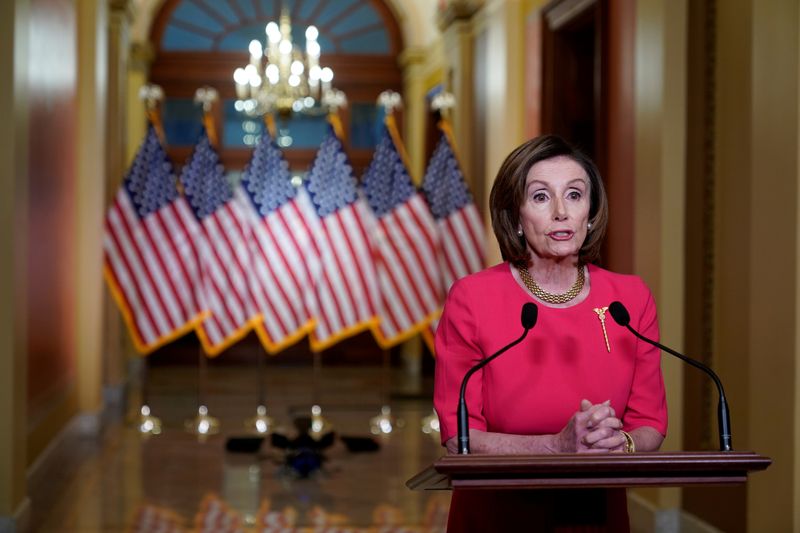By Susan Cornwell and David Morgan
WASHINGTON (Reuters) - U.S. state and local governments could need close to $1 trillion in aid over several years to cope with the aftermath of the coronavirus pandemic, House Speaker Nancy Pelosi said on Thursday as lawmakers began plotting more coronavirus relief legislation.
But the Democrat's proposal drew an immediate negative reaction from an influential member of the Republican-run Senate, John Cornyn, who called it "outrageous."
At a news conference, Pelosi said the Democratic-majority House of Representatives planned to return to session the week of May 11, but also indicated that could change, saying lawmakers are "at the mercy of the virus." The Republican-run Senate returns next week after an extended recess.
Pelosi said money for state and local governments would be the core of the next legislative package Democrats draft to respond to the virus, although she also named other priorities, such as extending broadband access. House Republican leader Kevin McCarthy also on Thursday endorsed talk of expanding broadband access. A bill has yet to emerge.
"I've talked about almost a trillion dollars right there," Pelosi said of state and local government needs. "But we do have other issues that we want to deal with."
"We're not going to be able to cover all of it but to the extent that we can keep the states and localities sustainable, that's our goal," Pelosi said. Earlier, she had told CNN that the additional aid would be intended to help sustain states for up to four years.
It was the first time Pelosi has used such a high number publicly when talking of covering state and local costs of battling the COVID-19 pandemic. State governors have requested $500 billion to help cover public health expenses and lost tax revenues and assist people getting back to work.
But Cornyn noted lawmakers have already provided states and cities $150 billion. "That ($1 trillion) strikes me as a pretty outrageous number," the Republican told reporters in the Capitol.
Senate Majority Leader Mitch McConnell, the chamber's top Republican, has signaled openness to more city and state aid. But he told Fox (NASDAQ:FOX) News earlier on Thursday that he was not interested in "borrowing money from future generations to send down to the states to help them with bad decisions they've made in the past, unrelated to the coronavirus epidemic."
McConnell also wants provisions to protect businesses from coronavirus-related litigation. Democrats dislike this idea.
Congress has not met in regular session since last month, though it has passed major coronavirus relief bills worth nearly $3 trillion.

Although the full House is not returning next week, an appropriations committee plans to meet on Wednesday to discuss the government's coronavirus response, and Pelosi said other "smaller" panels could also meet.